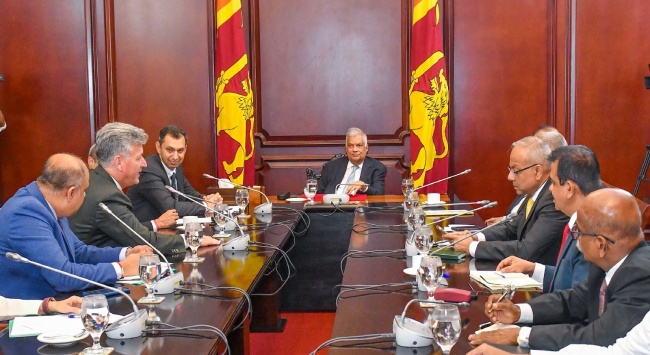Sri Lankan’s Regional Partnerships Amidst Growing Domestic Political Uncertainty
Rajni Gamage
30 May 2024Summary
In 2024, the Sri Lankan government has continued to navigate the fallouts of the 2022 economic crisis. The country’s engagement with key bilateral players can be broadly categorised into the administrative reform, security and economic sectors. Unfolding domestic political events will significantly impact these evolving regional partnerships.
Policy Learning and Administrative Reforms
The 2022 economic crisis in Sri Lanka is characterised as a crisis of governance at its core. This refers to conditions of poor governance undermining existing checks and balances in the management of public finance and exercise of political power. In the aftermath of the economic crisis, the Sri Lankan government is observed to engage in policy learning which includes training of government officials from key bilateral partners.
In February 2024, Sri Lanka and India commenced bilateral talks to enhance collaboration in personnel administration and governance. The primary focus of the talks was the development of a memorandum of understanding (MoU) between the Sri Lanka Institute of Development Administration and India’s National Centre for Good Governance. This MoU aims to conduct capacity building programmes for senior and mid-level Sri Lankan civil servants. Policy learning from India on administrative reforms was especially highlighted and it includes e-governance initiatives and unified service portals. The bilateral initiative emphasised capacity development in Sri Lankan government institutions which were expected to contribute to the nation’s economic performance.
Meanwhile, in February 2024, the Japanese government committed to promote economic governance in Sri Lanka through anti-corruption policy support. This 137 million JPY (S$177.7 million)-earmarked project will be jointly implemented by the Sri Lankan government and the United Nation Development Programme. The project focuses on strengthening legal and policy frameworks, improving coordination among institutions combating financial and tax crimes and enhancing skills and capacities to combat corruption. This initiative aims to enhance public service delivery, uphold the rule of law and encourage foreign direct investment.
In a similar demonstration of policy learning and training, in May 2024, Singapore extended an offer to assist in upgrading Sri Lanka’s immigration system. A delegation from Singapore’s Immigration & Checkpoints Authority subsequently visited Sri Lanka to explore opportunities to integrate advanced technology into Sri Lanka’s immigration processes. This initiative follows a request made by Sri Lanka’s Minister of Public Security, Tiran Alles, to Singapore’s Minister for Home Affairs and Law, K Shanmugam.
Bilateral Security Cooperation Versus Economic Engagement
While the Sri Lankan government engages in such administrative reforms-oriented policy learning on the governance front – from key bilateral partners such as India, Japan and Singapore – the country’s security cooperation initiatives are seen to be largely with India and the United States (US). This aligns with the current government’s tilt towards the Quadrilateral Security Dialogue (Quad) countries on regional security cooperation.
In April 2024, the Cooperation Afloat Readiness And Training series (Sri Lanka) 2024 naval exercise was held in Trincomalee. This is the largest bilateral military exercise between Sri Lanka and the US, designed to promote regional security cooperation and to maintain a free and open Indo-Pacific, practice humanitarian assistance and disaster relief and strengthen maritime partnerships and interoperability.
Meanwhile, the Sri Lankan and Indian police and intelligence authorities are reported to be exchanging information regarding four Sri Lankans arrested at the Ahmedabad airport in India in May 2024 by Gujarat’s Anti-Terrorism Squad. The arrested individuals are alleged to have Islamic State of Iraq and Syria (ISIS) associations. In April 2019, a series of coordinated ISIS-related terrorist suicide bombings were carried out (known as the Easter Sunday attacks) in Sri Lanka, with a total of 259 casualties, which included 45 foreign nationals. Indian intelligence agencies were reported to have provided early warnings to the Sri Lankan authorities, gathered from interrogation of a suspected Islamic State of Iraq and the Levant recruit in Indian custody.
In contrast, bilateral cooperation with China appears to be largely relegated to the economic front. It was reported in March 2024 that Sri Lanka will sign a “sister district” partnership with China’s 40-district Chongqing province. This applies to all 25 Sri Lankan districts and is aimed at attracting investments and enhancing production capacity, announced State Minister of Social Empowerment Anupa Pasqual. This collaboration is part of China’s One Belt, One Road and include collaborations between Sri Lanka’s Ministry of Social Empowerment and Chongqing province, involving 33 vocational training institutes, with a commitment to train 100,000 Sri Lankans.
Growing Domestic Political Uncertainty
These regional engagements occur against the backdrop of increasingly uncertain domestic political developments. On 28 May 2024, President Ranil Wickremesinghe’s political party, the United National Party’s General Secretary, Palitha Range Bandara, proposed holding a referendum to postpone both the presidential and parliamentary elections by two years. The Elections Commission had announced that the presidential elections were likely to be held during September or October this year, and criticised potential election delay moves. This move to postpone the elections was also criticised by the two main political contenders – the Samagi Jana Balawegaya which forms the main Opposition Party in parliament, and the National People’s Power, a Marxist-Leninist party which is considered to be the frontrunner in the upcoming elections. The president’s main governing partner – the Rajapaksa-led Sri Lanka Podujana Peramuna – has also expressed opposition to the move. The president subsequently clarified that there would be no move to delay the polls.
Nevertheless, unfolding events and their impact on Sri Lanka’s regional engagements and broader regional stability and security require close observation.
. . . . .
Dr Rajni Gamage is a Postdoctoral Fellow at the Institute of South Asian Studies (ISAS), an autonomous research institute at the National University of Singapore (NUS). She can be contacted at r.gamage@nus.edu.sg. The author bears full responsibility for the facts cited and opinions expressed in this paper.
Pic Credit: Ranil Wickremesinghe
-
 More From :
More From :
-
 Tags :
Tags :
-
 Download PDF
Download PDF


